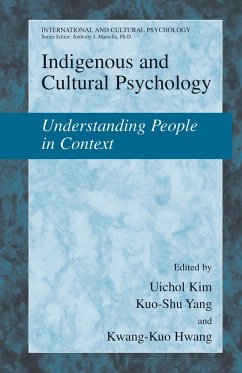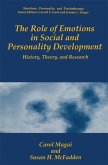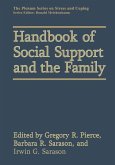It was once assumed that the bedrock concepts of psychology held true for all the world s peoples. More recently, post-modern approaches to research have expanded on these Western models, building a psychology that takes into account the sociopolitical, historical, religious, ecological, and other indigenous factors that make every culture, as well as every person as agents of their own actions.
Indigenous and Cultural Psychology surveys psychological and behavioral phenomena in native context in various developing and developed countries, with particular focus on Asia. An international team of 28 experts clarifies culture-specific concepts (such as paternalism and the Japanese concept of amae), models integrative methods of study, and dispels typical misconceptions about the field and its goals. The results reflect culturally sound frames of reference while remaining rigorous, systematic, and verifiable. These approaches provide a basis for the discovery of true psychological universals.
Among the topics featured:
- Scientific and philosophical bases of indigenous psychology
- Comparisons of indigenous, cultural, and cross-cultural psychologies
- Socialization, parent-child relationship, and family
- The private and public self: concepts from East Asia, Europe, and the Americas
- Interpersonal relationships: concepts from East Asia, Europe,, and the U.S.
- Factors promoting educational achievement and organizational effectiveness in Asia
- The growth and indigenization of psychology in developing and developed countries
- Are any values, attitudes, beliefs and traits universal? Cross-national comparisons
- The potential for indigenous psychology to lead to a global psychology
With this book, the editors have captured a growing field at a crucial stage in its evolution. Indigenous and Cultural Psychology benefits students and researchers on two levels, offering groundbreaking findings on understudied concepts, and signaling future directions in universal knowledge.
Hinweis: Dieser Artikel kann nur an eine deutsche Lieferadresse ausgeliefert werden.
Indigenous and Cultural Psychology surveys psychological and behavioral phenomena in native context in various developing and developed countries, with particular focus on Asia. An international team of 28 experts clarifies culture-specific concepts (such as paternalism and the Japanese concept of amae), models integrative methods of study, and dispels typical misconceptions about the field and its goals. The results reflect culturally sound frames of reference while remaining rigorous, systematic, and verifiable. These approaches provide a basis for the discovery of true psychological universals.
Among the topics featured:
- Scientific and philosophical bases of indigenous psychology
- Comparisons of indigenous, cultural, and cross-cultural psychologies
- Socialization, parent-child relationship, and family
- The private and public self: concepts from East Asia, Europe, and the Americas
- Interpersonal relationships: concepts from East Asia, Europe,, and the U.S.
- Factors promoting educational achievement and organizational effectiveness in Asia
- The growth and indigenization of psychology in developing and developed countries
- Are any values, attitudes, beliefs and traits universal? Cross-national comparisons
- The potential for indigenous psychology to lead to a global psychology
With this book, the editors have captured a growing field at a crucial stage in its evolution. Indigenous and Cultural Psychology benefits students and researchers on two levels, offering groundbreaking findings on understudied concepts, and signaling future directions in universal knowledge.
Hinweis: Dieser Artikel kann nur an eine deutsche Lieferadresse ausgeliefert werden.
From the reviews of the first edition:
"The legacy of this benchmark publication will be its unparalleled success not only in correcting misunderstandings, but also in further informing readers about the nature, methods, and processes of indigenization in psychology. The book moves indigenous psychology closer to its aim of discovering genuine universals through a melding of the content of psychological phenomena with the contexts in which psychological phenomena are situated. . . This book is essential reading for psychologists and graduate psychology student interested in how psychology as a discipline is being transformed by local, national, regional, and global trends that are driving culture into the forefront of contemporary life." -- Michael J. Stevens, PhD, DHC, President-Elect, APA Division of International Psychology
"In this globalizing era, mutual understanding across cultural and ethnic lines is a key prerequisite for a progressive and booming world, but what is less obvious is that this understanding is rootless if not grounded in context. This volume provides a state-of-the-art review of the issues and substance of indigenous and cultural psychology and the importance of understanding in context by a slate of luminaries in the field. This collection of essays is comprehensive and insightful, and is definitely a must-read for those who are interested in culture as well as in the peaceful co-existence and synergistic collaboration of diverse cultural groups." -- Kwok Leung, City University of Hong Kong, Tat Chee Avenue, Kowloon, Hong Kong
"The indigenous psychology perspective has grown to become an important force to be recognized in the development of a global psychology, and Kim, Yang, and Hwang assemble a cadre of the world's leaders in this movement. This volume represents a tour-de-force in the area, providing the latest, state-of-the-art scholarly information in a wide range of relevant topics. It highlights the importance of an understanding of people in context, a view that much of psychology has forgotten over the years. This book should be mandatory reading for psychologists from all backgrounds and perspectives, and will be a valuable addition to personal and institutional libraries worldwide." -- David Matsumoto, San Francisco State University, San Francisco, CA, USA
"New ideas in "psychology" are extremely rare but this book presents a uniquely new idea about applying the framework of psychological analysis in a global context. Up until now indigenous psychology has been stereotyped as exotic and has been almost entirely defined by its opposition to conventional psychological theory. This book gives the construct of indigenous and cultural psychology an independent existence and separate reality. . .This book provides the conceptual basis for separate status to indigenous psychology as an independent theoretical framework in its own right. The field of psychology will be forever changed by this book for those who take the time to read it. The book provides a new paradigm for understanding human behavior from a global perspective that is sadly missing in most if not all psychological textbooks." -- Paul Pedersen, Professor Emeritus, Syracuse University and Visiting Professor, Department of Psychology, University of Hawaii, HI, USA
"This much needed volume fills a gap in our "understanding of people in context." It addresses a basic debate in cultural and cross-cultural psychology, that is, whether the unique-universal dynamics is to be construed as contradictory or complementary. The many contributors, well known in the field, shed light on indigenous and cultural psychology, covering a broad range of topics from philosophical perspectives to understanding of self and personality, from family and socialization to cognitive processes, from theory to applications. The book provides an alternative to mainstream "Western" psychology and much food for thought for the intellectually curious reader in grasping both the diversity and commonality in human psychology from a global perspective." -- Cigdem Kagitcibasi, Koc University, Istanbul, Turkey
"The volume is quite timely. ... The book is a pioneer in indigenous and cultural psychology ... . it is quite comprehensive, comprising no fewer than 30 contributors, all specialists in indigenous and cultural psychology. ... Indigenous and cultural psychology challenges the mainstream, traditional understanding of the nature of people, compelling us to rethink, in radical, fundamental ways, our assumed basic theories of personality, perception, cognition, emotion, development, social psychology, and the like." -- Ruth Chao, PsycCRITIQUES, Vol. 51 (42), 2006
"This 518-page book contains contributions from 30 international experts. The material covers a wide geographical area ... . The choice of topics is also wide, including interesting insights regarding child development, personality and cognitive processes. ... This volume has helped me gain a better understanding of the cultural contexts which some of my clients come from. ... This book has a very readable style, is well referenced, and has a useful subject index. I recommend it to anyone interested in cultural psychology." -- Dr. Debbie Hawker, The Psychologist, Vol. 20 (1), January, 2007
"Indigenous and Cultural Psychology surveys psychological and behavioral phenomena in native context in various developing and developed countries ... . With this book, the editors have captured a growing field at a crucial stage in its evolution. Indigenous and Cultural Psychology benefits students and researchers on two levels, offering groundbreaking findings on understudied concepts, and signaling future directions in universal knowledge." -- Anthony J. Marsella, International Journal of Mental Health Addiction, Vol. 4, 2006
"The legacy of this benchmark publication will be its unparalleled success not only in correcting misunderstandings, but also in further informing readers about the nature, methods, and processes of indigenization in psychology. The book moves indigenous psychology closer to its aim of discovering genuine universals through a melding of the content of psychological phenomena with the contexts in which psychological phenomena are situated. . . This book is essential reading for psychologists and graduate psychology student interested in how psychology as a discipline is being transformed by local, national, regional, and global trends that are driving culture into the forefront of contemporary life." -- Michael J. Stevens, PhD, DHC, President-Elect, APA Division of International Psychology
"In this globalizing era, mutual understanding across cultural and ethnic lines is a key prerequisite for a progressive and booming world, but what is less obvious is that this understanding is rootless if not grounded in context. This volume provides a state-of-the-art review of the issues and substance of indigenous and cultural psychology and the importance of understanding in context by a slate of luminaries in the field. This collection of essays is comprehensive and insightful, and is definitely a must-read for those who are interested in culture as well as in the peaceful co-existence and synergistic collaboration of diverse cultural groups." -- Kwok Leung, City University of Hong Kong, Tat Chee Avenue, Kowloon, Hong Kong
"The indigenous psychology perspective has grown to become an important force to be recognized in the development of a global psychology, and Kim, Yang, and Hwang assemble a cadre of the world's leaders in this movement. This volume represents a tour-de-force in the area, providing the latest, state-of-the-art scholarly information in a wide range of relevant topics. It highlights the importance of an understanding of people in context, a view that much of psychology has forgotten over the years. This book should be mandatory reading for psychologists from all backgrounds and perspectives, and will be a valuable addition to personal and institutional libraries worldwide." -- David Matsumoto, San Francisco State University, San Francisco, CA, USA
"New ideas in "psychology" are extremely rare but this book presents a uniquely new idea about applying the framework of psychological analysis in a global context. Up until now indigenous psychology has been stereotyped as exotic and has been almost entirely defined by its opposition to conventional psychological theory. This book gives the construct of indigenous and cultural psychology an independent existence and separate reality. . .This book provides the conceptual basis for separate status to indigenous psychology as an independent theoretical framework in its own right. The field of psychology will be forever changed by this book for those who take the time to read it. The book provides a new paradigm for understanding human behavior from a global perspective that is sadly missing in most if not all psychological textbooks." -- Paul Pedersen, Professor Emeritus, Syracuse University and Visiting Professor, Department of Psychology, University of Hawaii, HI, USA
"This much needed volume fills a gap in our "understanding of people in context." It addresses a basic debate in cultural and cross-cultural psychology, that is, whether the unique-universal dynamics is to be construed as contradictory or complementary. The many contributors, well known in the field, shed light on indigenous and cultural psychology, covering a broad range of topics from philosophical perspectives to understanding of self and personality, from family and socialization to cognitive processes, from theory to applications. The book provides an alternative to mainstream "Western" psychology and much food for thought for the intellectually curious reader in grasping both the diversity and commonality in human psychology from a global perspective." -- Cigdem Kagitcibasi, Koc University, Istanbul, Turkey
"The volume is quite timely. ... The book is a pioneer in indigenous and cultural psychology ... . it is quite comprehensive, comprising no fewer than 30 contributors, all specialists in indigenous and cultural psychology. ... Indigenous and cultural psychology challenges the mainstream, traditional understanding of the nature of people, compelling us to rethink, in radical, fundamental ways, our assumed basic theories of personality, perception, cognition, emotion, development, social psychology, and the like." -- Ruth Chao, PsycCRITIQUES, Vol. 51 (42), 2006
"This 518-page book contains contributions from 30 international experts. The material covers a wide geographical area ... . The choice of topics is also wide, including interesting insights regarding child development, personality and cognitive processes. ... This volume has helped me gain a better understanding of the cultural contexts which some of my clients come from. ... This book has a very readable style, is well referenced, and has a useful subject index. I recommend it to anyone interested in cultural psychology." -- Dr. Debbie Hawker, The Psychologist, Vol. 20 (1), January, 2007
"Indigenous and Cultural Psychology surveys psychological and behavioral phenomena in native context in various developing and developed countries ... . With this book, the editors have captured a growing field at a crucial stage in its evolution. Indigenous and Cultural Psychology benefits students and researchers on two levels, offering groundbreaking findings on understudied concepts, and signaling future directions in universal knowledge." -- Anthony J. Marsella, International Journal of Mental Health Addiction, Vol. 4, 2006








